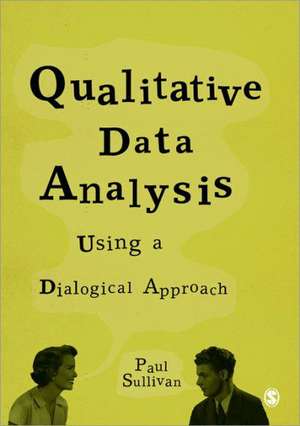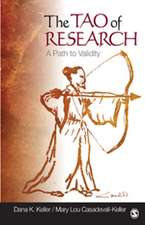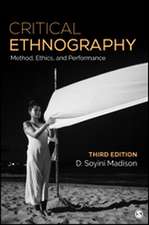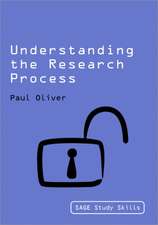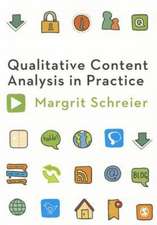Qualitative Data Analysis Using a Dialogical Approach
Autor Paul Sullivanen Limba Engleză Paperback – 8 dec 2011
As well as exploring the theory behind this innovative method, Sullivan provides sound practical advice that recognises the everyday analytic needs of the reader.
Topics include:
• The theoretical foundations of the approach
• The role of subjectivity in qualitative research
• Data preparation and analysis
• The future of the approach
Theoretical discussion is consistently accompanied by research examples and suggestions as to how the dialogical approach could be used in the reader's own research. This important and timely book is ideal for any reader who wants to do research with dialogue and who is keen to attend to the full nuances and complexities of discourse.
| Toate formatele și edițiile | Preț | Express |
|---|---|---|
| Paperback (1) | 374.72 lei 3-5 săpt. | +19.23 lei 6-10 zile |
| SAGE Publications – 8 dec 2011 | 374.72 lei 3-5 săpt. | +19.23 lei 6-10 zile |
| Hardback (1) | 1108.73 lei 6-8 săpt. | |
| SAGE Publications – 8 dec 2011 | 1108.73 lei 6-8 săpt. |
Preț: 374.72 lei
Nou
Puncte Express: 562
Preț estimativ în valută:
71.71€ • 73.98$ • 60.69£
71.71€ • 73.98$ • 60.69£
Carte disponibilă
Livrare economică 12-26 februarie
Livrare express 28 ianuarie-01 februarie pentru 29.22 lei
Preluare comenzi: 021 569.72.76
Specificații
ISBN-13: 9781849206105
ISBN-10: 1849206104
Pagini: 208
Ilustrații: black & white tables
Dimensiuni: 156 x 234 x 12 mm
Greutate: 0.32 kg
Ediția:1
Editura: SAGE Publications
Colecția Sage Publications Ltd
Locul publicării:London, United Kingdom
ISBN-10: 1849206104
Pagini: 208
Ilustrații: black & white tables
Dimensiuni: 156 x 234 x 12 mm
Greutate: 0.32 kg
Ediția:1
Editura: SAGE Publications
Colecția Sage Publications Ltd
Locul publicării:London, United Kingdom
Recenzii
Dr Sullivan provides an accessible and pragmatic, yet sophisticated, introduction to dialogical analysis. This book will be of great interest to students and researchers looking to expand their skills in qualitative analysis and offers many novel and creative ideas for approaching qualitative data
Dr Anna Madill
Reader in Qualitative Inquiry, University of Leeds
Sullivan delivers a compelling set of arguments in favour of the use of a dialogical approach in qualitative data collection and analysis. His work is well-argued and supported by the use of relevant literature and examples of the approach in practice through reference to case studies. Sullivan achieves his aim of making the book as accessible and user-friendly as possible through: the provision of a detailed contents section; clearly communicated chapters using little jargon; reference to examples of how to apply the approach in practice; tables summarising key information and, links to further recommended reading. Despite the complex nature of the dialogical approach the above format suggests that there is potential for successfully using the approach. This would apply to practitioners, academics and students from a range of disciplinary backgrounds engaged in differing forms of qualitative research. Based on this I would recommend Sullivan’s text as an introduction to a challenging yet accessible, innovative and rewarding way of undertaking and analysing future qualitative research studies
Emma Smith
Methodspace Book Reviews Group
The book can easily be read because the author employs terms carefully, using a simple and clear language. He avoids too technical terms and uses a simplified style to guarantee that readers understand its objectives. Sullivan's style is illustrative and uses examples all along the book about dialogical logic through diverse disciplines...To sum up; Sullivan offers an important material for qualitative methods' users...His work is a rich source of illustrations, figures, tables, examples and further readings, fulfilled by a rich, consistent and updated bibliography.
Nadia IDRI
Methodspace Book Reviews Group
I enjoyed this book very much. It is well written and is suitable for lecturers, researchers and students who wish to know more not just about the Bakhtinian dialogical approach but also other more mainstream and favoured qualitative research methodologies. It is highly readable and being written by the same author, rather than being a series of edited chapters by disparate writers, means that the chapters link well together... Sullivan uses copious examples from his own research and brings us from the very beginning, the planning stage, right through to the writing up stage of a number of his and other researchers' work. At all times it is written in a clear accessible, and at times humorous, manner... This is a good book on an important area which will contribute to the increasing presence of qualitative research in academic departments throughout the world.
Joe MacDonagh
Qualitative Methods in Psychology
Dr Anna Madill
Reader in Qualitative Inquiry, University of Leeds
Sullivan delivers a compelling set of arguments in favour of the use of a dialogical approach in qualitative data collection and analysis. His work is well-argued and supported by the use of relevant literature and examples of the approach in practice through reference to case studies. Sullivan achieves his aim of making the book as accessible and user-friendly as possible through: the provision of a detailed contents section; clearly communicated chapters using little jargon; reference to examples of how to apply the approach in practice; tables summarising key information and, links to further recommended reading. Despite the complex nature of the dialogical approach the above format suggests that there is potential for successfully using the approach. This would apply to practitioners, academics and students from a range of disciplinary backgrounds engaged in differing forms of qualitative research. Based on this I would recommend Sullivan’s text as an introduction to a challenging yet accessible, innovative and rewarding way of undertaking and analysing future qualitative research studies
Emma Smith
Methodspace Book Reviews Group
The book can easily be read because the author employs terms carefully, using a simple and clear language. He avoids too technical terms and uses a simplified style to guarantee that readers understand its objectives. Sullivan's style is illustrative and uses examples all along the book about dialogical logic through diverse disciplines...To sum up; Sullivan offers an important material for qualitative methods' users...His work is a rich source of illustrations, figures, tables, examples and further readings, fulfilled by a rich, consistent and updated bibliography.
Nadia IDRI
Methodspace Book Reviews Group
I enjoyed this book very much. It is well written and is suitable for lecturers, researchers and students who wish to know more not just about the Bakhtinian dialogical approach but also other more mainstream and favoured qualitative research methodologies. It is highly readable and being written by the same author, rather than being a series of edited chapters by disparate writers, means that the chapters link well together... Sullivan uses copious examples from his own research and brings us from the very beginning, the planning stage, right through to the writing up stage of a number of his and other researchers' work. At all times it is written in a clear accessible, and at times humorous, manner... This is a good book on an important area which will contribute to the increasing presence of qualitative research in academic departments throughout the world.
Joe MacDonagh
Qualitative Methods in Psychology
Cuprins
Introducing Dialogue to Qualitative Analysis
Analyzing Subjectivity in Qualitative Research
Using Dialogue to Explore Subjectivity
Data Preparation and Analysis
Writing up an Analysis
Double-Voiced Discourse and Focus Group Data
Analyzing Commentaries on Subjectivity
Evaluation
Discussion
Analyzing Subjectivity in Qualitative Research
Using Dialogue to Explore Subjectivity
Data Preparation and Analysis
Writing up an Analysis
Double-Voiced Discourse and Focus Group Data
Analyzing Commentaries on Subjectivity
Evaluation
Discussion
Descriere
A major new contribution to the field of qualitative data analysis, this book sets out the theory and practice of dialogical approaches.
